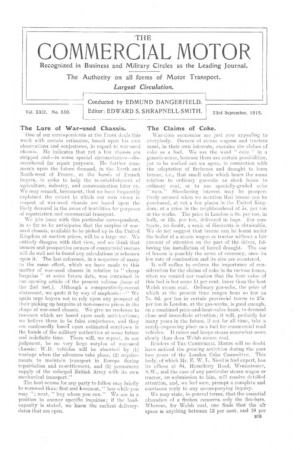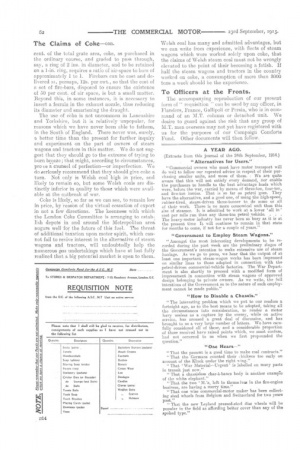The Lure of War-used Chassis.
Page 1

Page 2

If you've noticed an error in this article please click here to report it so we can fix it.
One of our correspondents at the Front duals this week with certain estimates, based_ upon his own observations and conjectures, in regard to war-used chassis. He indicates that not a tow chassis are stripped and—in some special eircimistances--dismembered. for repair purposes. He further com
ments upon the future demand, in the ...North and North-west of France, at the hands of French buyers, • in order to help the re-establishment of agriculture, industry, and communication later on.
We may remark, hereanent, that we have frequently explained the extent to which our own views in respect of war-used chassis are based upon the likely demand in the areas of hostilities for purposes of repatriation and commercial transport.
We join issue with this particular correspondent, in so far as he. anticipates that the surplus of war
used chassis, available to be picked up in the United Kingdom at auction prices, will he a large one. We entirely disagree with that view, and we think that owners arid prospective owners of commercial motors will do well not to found any calculations or schemes upon it. The last reference, in a• sequence of many to the same effect, which we have made. to this 'matter of war-used chassis in rotation to " cheap bargains " at some future date, was contained in. our opening article of the present volume (issue of the 2nd inst.). Although a comparatively-recent statement, we quote it by way of emphasis :—" We again urge buyers not. to rely upon any prospect of their picking up bargains at non-reserve prices in the shape of war-used chassis. We give: no credence to rumours which are Lased upon such antic tuitions; we believe them to be false conjectures, and they are confessedly based upon estimated surpluses in the hands of the military authorities at some future and indefinite time. There wiIl we. repeat, hi our judgment, be no • very large surplus of war-used chassis: W.D. vehicles will be absorbed by (1) wastage when the advances take place, (2) requirements to maintain transport in Europe. during repatriation and re-settlement, and (3) permanent supply of the enlarged British Army with its own mechanical transport."
The best course for any party to follow may briefly be summed thus: first and loremost, " buy while you may "; next, " buy where you can." We are in a position to answer specific inquiries; if the loadcapacity is stated, we know the earliest deliverydates that are open.
The Claims of Coke.
War-time economies are just now appealing to everybody. Owners of steam wagons and tractors must, in their own interests, examine the clatins of coke as a fuel. We use the word " coke in a generic sense, because there are certain possibilities, yet to be worked out we agree, in connection with the adaptation of fireboxes and draught to burn breeze, i.e., that small coke which bears the same relation to ordinary gas-eoko as slack bears to ordinary coal, or to use specially-graded coke nuts." Slumbering interest may be prospec
tively aroused when we mention that breeze can be purchased, at not a few places in the -United Kingdom, at a• price in the neighbourhood of 3s. per ton at the works. The price in London is 9s. per ton, in bulk, or 12s. per ton, delivered in bags. For contracts, no doubt, a:scale of discounts is obtainable. We do not suggest,that breeze can be burnt under the boiler of a. steam wagon or tractor without a fair amount of attention on the part of the driver, following the installation of forced draught. The use of breeze is pessibly the acme of economy, once its low rate of combustion and its size are countered.
Tb will suffice. to enforce the importance of con sideration for the claims of coke in its various forms, when we remind our readers that the heat value of this fuel is but some 14 per cent. lower than the best Welsh steam coal. Ordinary gas-coke, the price of which at the present time ranges frorn so low as 7s. Gd. per ton in certain provinekil towns to 2:is. per ton in London, at the gas-works, is good enough, on a combined price-and-heat-value basis, to denvmd close and immediate attention; it will, probably for many years in the future, if not for all time, take a surely-improving place as a fuel for commercial road vehicles. It raises and keeps steam somewhat more slowly than does Welsh steam coal.
Readers of THE COMMERCIAL MOTOR will no doubt
have noticed the growing activhies during the past two years of the London Coke Committee. This body, of which Mr. E. W. Ti. Nicol is fuel expert, has its offices at 84, Horseferry Road, Westminster, S.W., and the case of any particular steam wagon or tractor, on submission to him, will receive detailed attention, and, we feel sure, prompt a complete and courteous reply to any accompanying inquiry.
We may state, in general terms, that the essential alteration of a firebox concerns only the fire-bars. Whereas, for Welsh coal, one finds Mak; tli6 air space is anything between 12 per cent. and 18 per
cent, of the total grate area, coke, as purchased in the ordinary course, and graded to pass through, say, a ring of 2 ins, in diameter, and to be retained on a 1-in. ring, requires a ratio of air-space to bars of approximatel,y 1 to 1. Firebars can be east and delivered au, pernaps, 12s. per cwt., so that the cost of a set of fire-bars, disposed to ensure the existence of 50 per cent, of air space, is but a small matter. Beyond this, in some instances, it is necessary to insert a ferrule in the exhaust nozzle, thus reducing its diameter and smartening the draught.
The use of ceke is not uncommon in Lancashire and Yorkshire, but it is relatively -unpopular, for reasons which we have never been able to fathom., in the South of Engla.nd. There never was, surely, a better time than the present for further inquiry and experiment on the part of owners of steam wagons and tractors in this matter. We do not suggest that they should go to the extreme of trying to burn breeze ;.that might, according to circumstances, prove a =nisei Of perfection—or imperfection. We do seriously recommend that they should give coke a turn. Not only is Welsh coal high in price, and likely to remain so, but some Welsh coals are distinctly inferior in quality to those which were available at the outbreak of war.
Coke is likely, so far as we can see, to remain low in price, by r easbn of the virtual cessation of export in not a few' directions. The keenness with which the London Coke Committee is arranging to estab-, lish depots in.. and around the Metropolitan area augurs well'for the future of this fuel. The threat of additional taxation upon motor spirit, which cannot fail to revive interest in the alternative of steam wagons and tractors, will undoubtedly help the numerous as undertakings which have at last fully realized that, a big potential -market is open to them. Welsh coal has many and admitted advantages, but we can write from experience, with fleets of steam wagons which were worked solely upon coke, that the claims of Welsh steam coal must not be wrongly elevated to the point of their becoming a fetish. If half the steam wagons and tractors in the country worked on coke, a consumption of more than 3000 tons a week should be the experience.
To Officers at the Fronts.
The accompanying reproduction of our present form of " requisition " can be used by any officer, in Flanders, France, Gallipoli or Persia, who is in command of an M.T. column or detached Unit. We desire to guard against the risk that any group of M.T. men overseas may not yet have registered with us for the purposes of cur Campaign Comforts Fund. Other documents will then folldw.




















